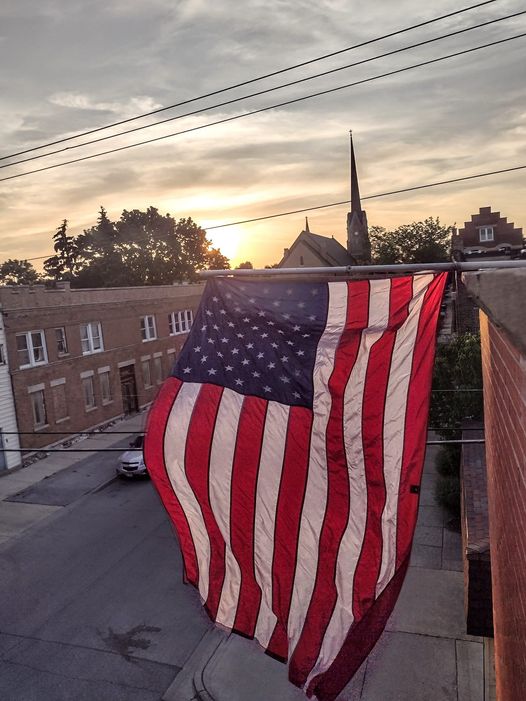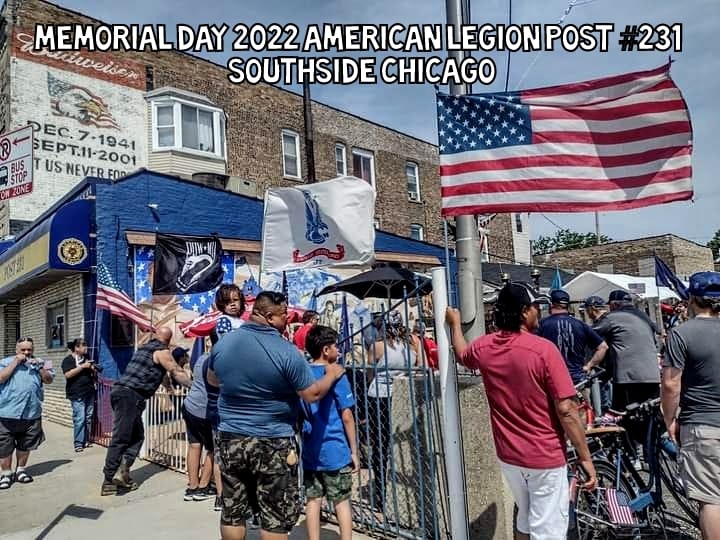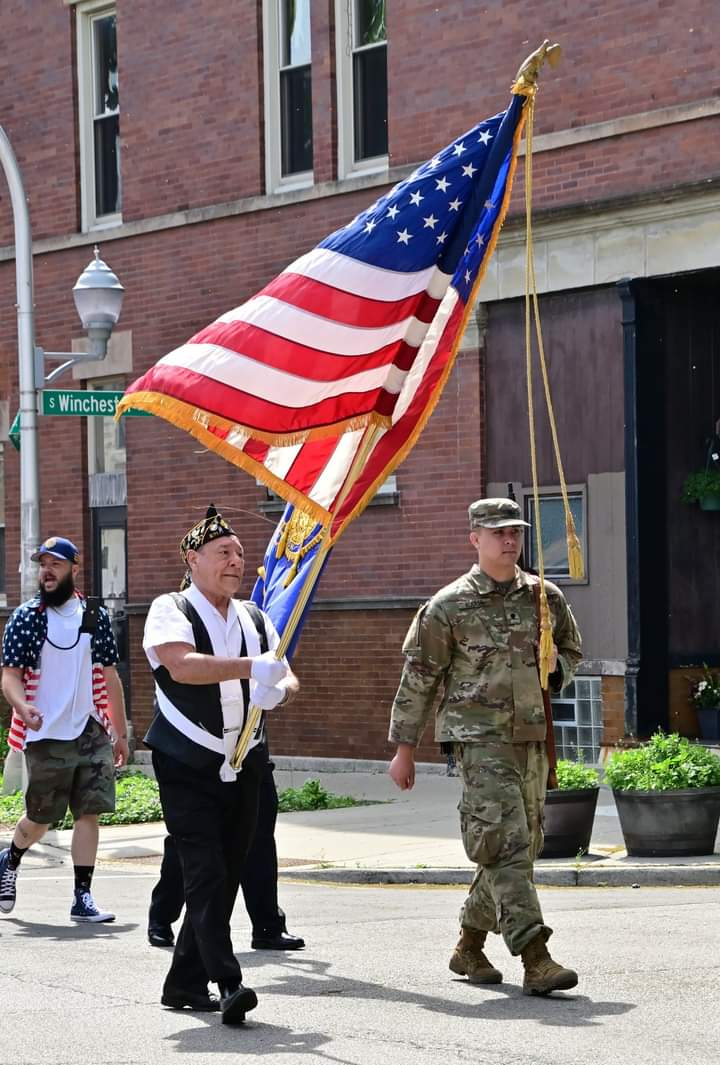Memorial Day 2022 - American Legion Post #231 McKinley Park Chicago
 Memorial Day 2022 (John Kugler/Substance News)
Memorial Day 2022 (John Kugler/Substance News)
Here are a few picures and links to the annual Memorial Day Parade in McKinley Park sponsored by American Legion Post #231
 Memorial Day 2022 (John Kugler/Substance News)
Memorial Day 2022 (John Kugler/Substance News)
 Memorial Day 2022 (John Kugler/Substance News)
Memorial Day 2022 (John Kugler/Substance News)
 Memorial Day 2022 (John Kugler/Substance News)
Memorial Day 2022 (John Kugler/Substance News)
Gun salute and Taps to remember fallen soldiers 2022 American Legion William McKinley Post #231 Chicago
Memorial Day Parade in McKinley Park sponsored by American Legion Post #231
2022 Memorial Day American Legion William McKinley Post #231 Chicago
Comments:
By: John Kugler
My Family
i had family killed by police during a work action. are you saying all police are killers?
By: John S.Whitfield
THE PAST ISN'T PAST
Organized labor is having a moment. In the last half-year alone, baristas at more than 200 Starbucks filed for union elections, software engineers at The New York Times formed the largest bargaining unit of tech workers in the country, and, despite pushback from the worldŌĆÖs biggest retailer, workers at a Staten Island ŌĆ£fulfillment centerŌĆØ voted to form the first Amazon union in the United States.
These are just a few of the labor stories that have hit mainstream news. After losing ground for decades, American workers appear to be fighting back against inadequate wages, subpar benefits, and consolidated corporate power.
ThatŌĆÖs one way to interpret the spate of recent events. Cynics might point to data that shows labor unions in the U.S. actually filed for fewer new elections in 2021 than the year before, or that last year union density continued to decline along the same downward trajectory it has for decades. Others argue that toothless American labor laws combined with multinational corporate employers (Starbucks, for example, operates more than 9,000 locations in the U.S. alone) mean that individual groups of workers are unlikely to win gains without significant changes to federal labor law, mass disruptive actions, or both.
Still, the shift in attitudes toward labor is palpable. Back in 2010, when I worked for a union in Oregon organizing caregivers for people with disabilities, I remember going to the movie theater to see Waiting for Superman, an ostensibly liberal film about public education that proceeded to vilify teachersŌĆÖ unions. It took a lot for me not to stand up and shout at the screen. (The issue was personal as well as political: My mom was a longtime public school teacher and union member.) At that time, it was not uncommon to hear from liberals that unions protected bad workers or were staffed by corrupt thugs. Conservatives, meanwhile, wanted to eradicate them entirely.
Now the momentum seems to be shifting. Public opinion polls show that a clear majority of Americans favor unions, while their Democratic president has expressed his support for organizing in no uncertain terms. Even Republicans have gotten in on the action, proposing a bill that would create alternative, company-friendly labor organizationsŌĆöan anti-union bill, to be sure, but a nod, nonetheless, to the ascendant power of labor as well as the untapped potential of an organized working class.
The pro-labor cultural turn has been aided by journalists, some of whom have themselves recently organized their media workplaces. Writers like Steven Greenhouse, Sarah Jaffe, Dave Jamieson, Edward Ongweso Jr., and Kim Kelly have revived a once-dormant labor beat by bringing skilled, on-the-ground reporting to important sites of labor struggle. In publications as varied as The New York Times, HuffPost, Vice, and Teen Vogue, readers can now find writing that is sympathetic or even celebratory of worker organizing where before the bias often skewed toward capital. It isnŌĆÖt hard to imagine that the work of these reporters has inspired a few union drives.
In Fight Like Hell: The Untold History of American Labor, Kim Kelly gives historical context to the fights for worker justice that she has been witnessing and reporting on for years. Some of the stories featured in KellyŌĆÖs book may be familiar to those with knowledge of U.S. labor history (garment worker strikes in Manhattan, farmworker organizing in California, the federal air traffic controllersŌĆÖ strike), but the authorŌĆÖs focus here is on workers who are not as well-known, whose voices, whether because of their marginalized identities or professions, have been actively suppressed, if not entirely forgotten. The struggles of sex workers and prison laborers receive full chapters, as do those of people with disabilities (a group that includes, Kelly points out, about 25% of all adults in the United States). While the emphasis is on history, their challenges continue to the present day. Sex workers continue to be stigmatized and persecuted, most recently by laws that make it more difficult for them to find clients online. Although incarcerated workers in North Carolina, Massachusetts, and elsewhere successfully formed unions in the 1970s, they were stripped of that right by the Supreme Court in 1977. Many workers with disabilities still receive less than minimum wage: Kelly reports that the average disabled woman in the U.S. makes about half the wages of the average non-disabled man.
This sense of continuity (between the struggles of workers past and present and across every marker of social difference) is one of the strongest aspects of KellyŌĆÖs book. In a chapter about garment workers, the story of a young Ukrainian immigrant worker-organizer named Clara Lemlich in early-20th-century Manhattan is followed by a portrait of Rosa Flores, a striking Chicana garment worker in Texas 60 years later, which leads to an account of contemporary garment workers in Southern California who continue to toil for low wages under terrible conditions. The past isnŌĆÖt dead. ItŌĆÖs not even past.
So little of our labor history makes it into mainstream narrativesŌĆöwhich is strange, when you think about it, because the vast majority of Americans are workers.
A few days ago, walking through the Beacon Hill neighborhood of Seattle where I live, only a handful of miles from the union office where two Filipino cannery worker organizers, Silme Domingo and Gene Viernes, were murdered for their activism in 1981, I mused to a friend about how so little of our labor history makes it into mainstream narrativesŌĆöwhich is strange, when you think about it, because the vast majority of Americans are workers. Not long after that, I received a phone call at work from a clerk at a hardware store who wanted information about organizing. He had seen what the Starbucks workers did and thought maybe he and his co-workers could do it too.
Organizing is contagious. Is it any surprise the ownership class prefers that we forget our own history? Reading KellyŌĆÖs book, I wondered who from the current wave of organizing would be immortalized by labor historiansŌĆöwhich baristas, which warehouse workers, which flight attendants and cashiers. But thatŌĆÖs the wrong question, I decided. Better to wonder about the movements these new worker-organizers will inspire. Better to think about who will come next.
ALEX GALLO-BROWN is a writer based in Seattle, where he works as a union organizer.
By: John Kugler
Faux Fight
My reading and sources tell me that there is an economic downturn coming. All we are experiencing are preparations for any social unrest issues with a possible economic depression. Second and more importantly, the current unrest and organizing keep the middle class in check.
Do you think its reasonable to pay a fast food worker $15 per hour? How much then should a Professional Auditor make that went to school 10 years? How does that reconcile with normal business needs and expenses? It doesn't.
Anyone that wants to expand rights in a time of scarcity is not paying attention to the world around us. Or is trying to instigate chaos and unrest so there can be more controls on the population.
Strange in Illinois the Dems control all the governing bodies, and in DC the dems also control all the governing bodies but we are still fighting?
Who we fighting again? Ourselves? seems foolish and childish.
I am more interested to fix problems rather than complaining all the time ...
By: Thosupt
brand name for tadalafil
A cluster of red flames was burning on the thunder in his chest, With the natural male enhancement tonic tea force of Gade s bursts of thunder suppressing crazily, but the effect was little, but there was a tendency to doctors brothers penis enlargement burn more and more intensely, even with this armor barrier, it was already faintly felt purchase cialis online cheap 2004; 34 6 363 369


By: john whitfield
MEMORIAL DAY, 1937
On May 30, 1937, Chicago police attacked a Memorial Day gathering of unarmed, striking steelworkers and their families. The police shot and killed ten of the strikers. Read an essay below by renowned author Howard Fast and watch video clips.
By Howard Fast
Memorial Day in Chicago in 1937 was hot, humid, and sunny; it was the right kind of day for the parade and the holiday, the kind of a day that takes the soreness out of a Civil War veteranŌĆÖs back, makes him feel like stepping out with the youngsters a quarter his age. It was a day for picnics, for boating, for the beach or a long ride into the country. . . Most of the strikers felt good.
Tom Girdler, who ran Republic, had said that he would go back to hoeing potatoes before he met the strikersŌĆÖ demands, and word went around that old Tom could do worse than earn an honest living hoeing potatoes. The strike was less than a week old; the strikers had not yet felt the pinch of hunger, and there was a good sense of solidarity everywhere.
Because it was such a fine summer day, many of the strikers brought their children out onto the prairie to attend the first big mass meeting; and wherever you looked, you saw two-year-olds and three-year-olds riding pick-a-back on the shoulders of steelworkers.